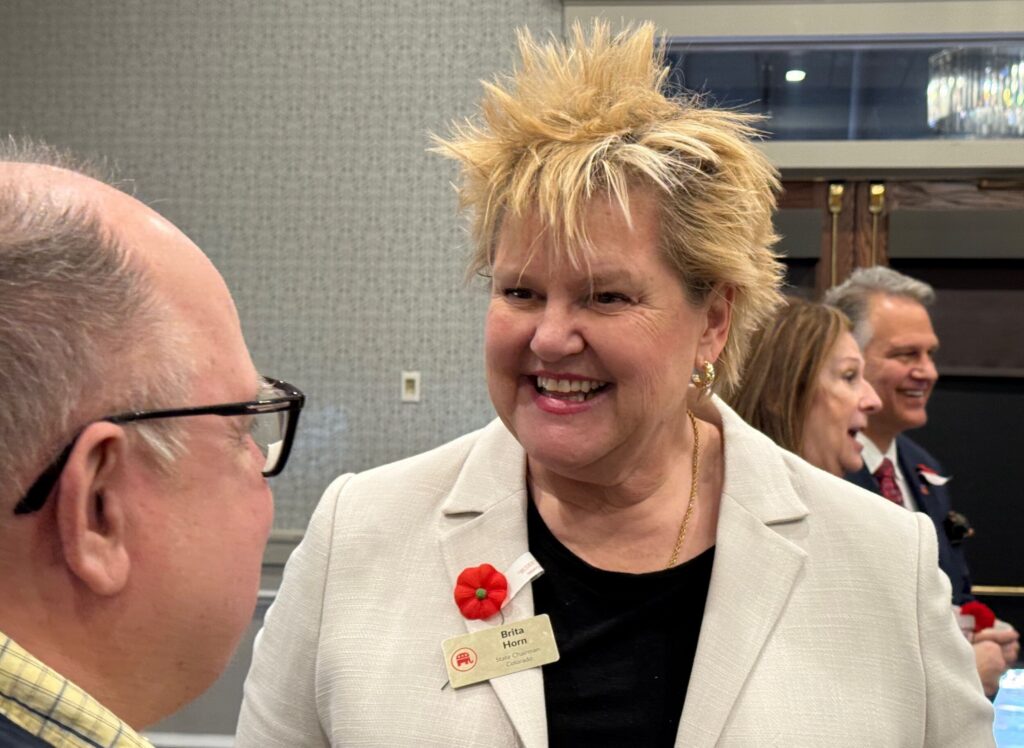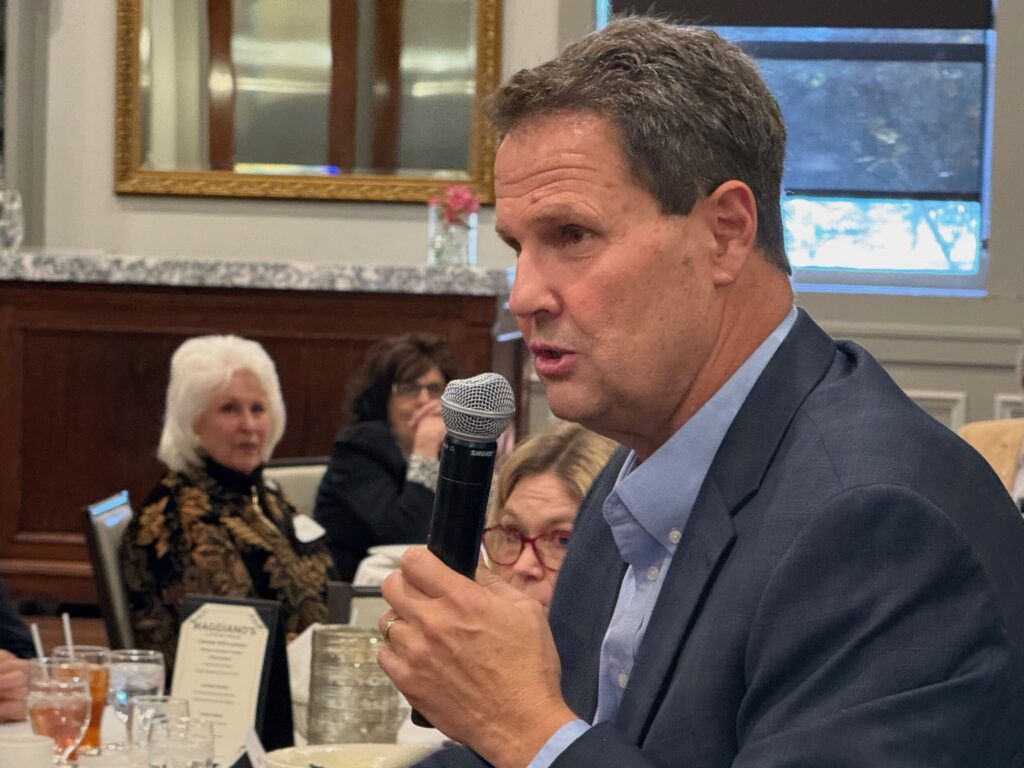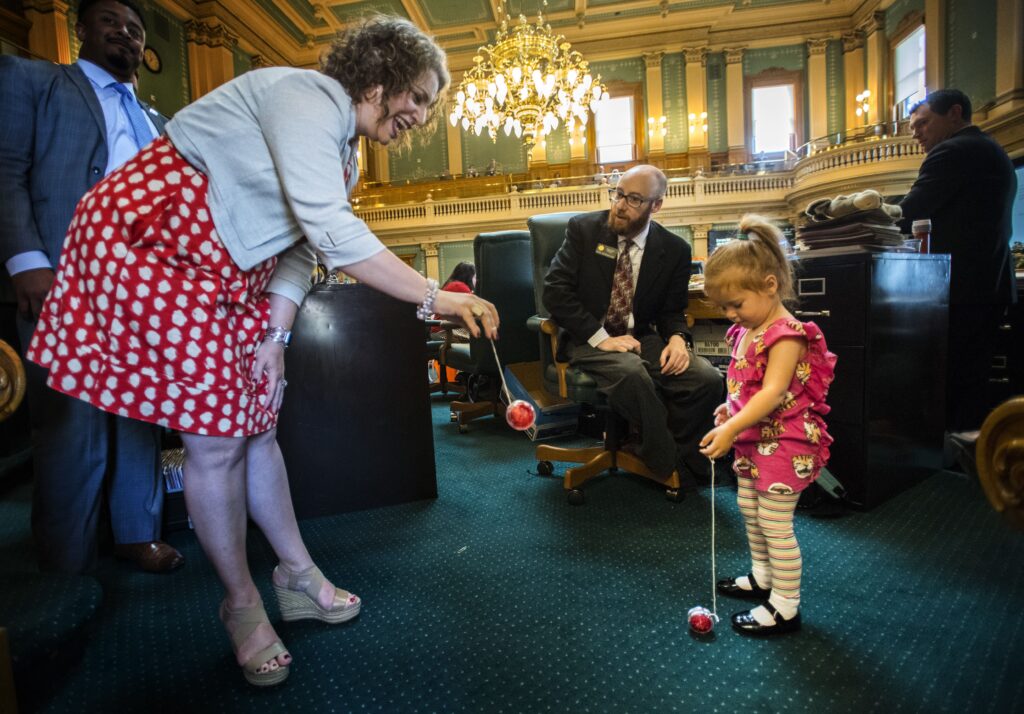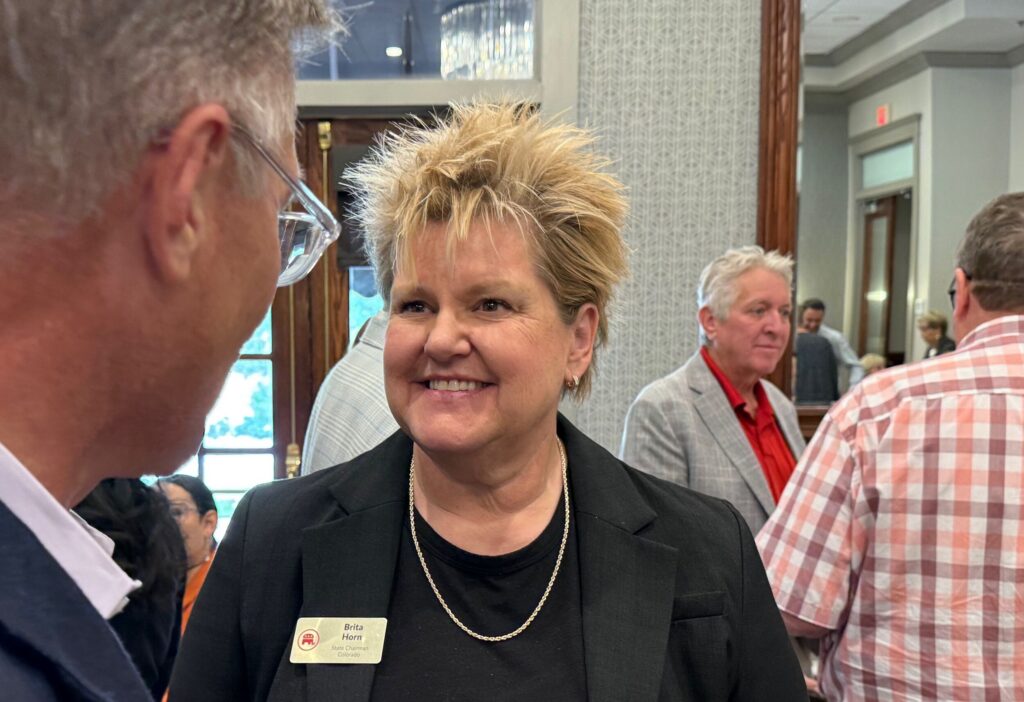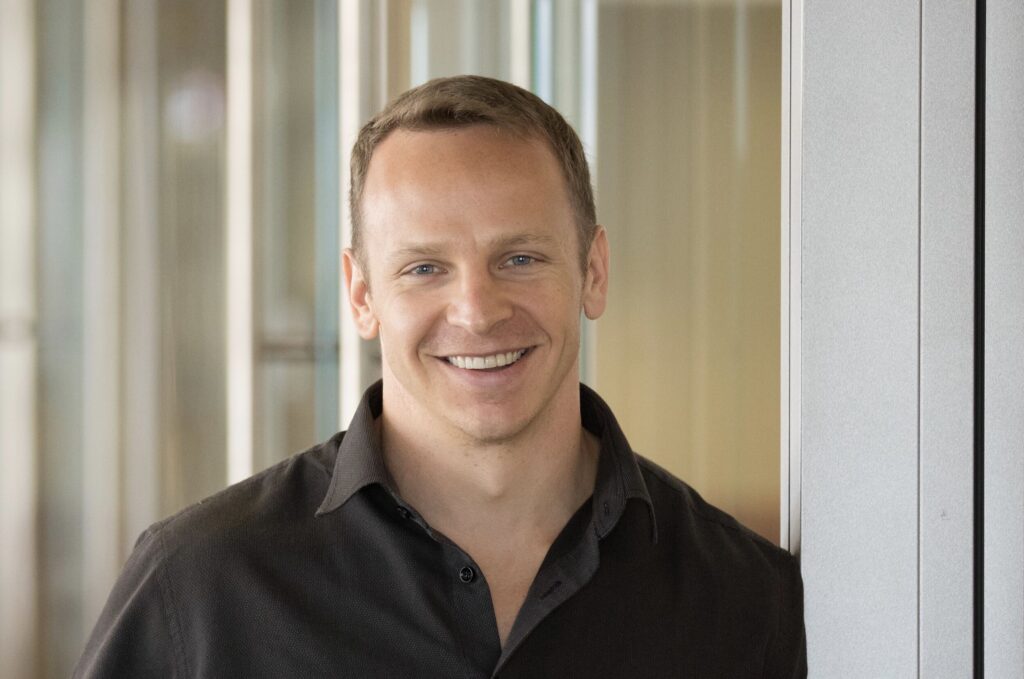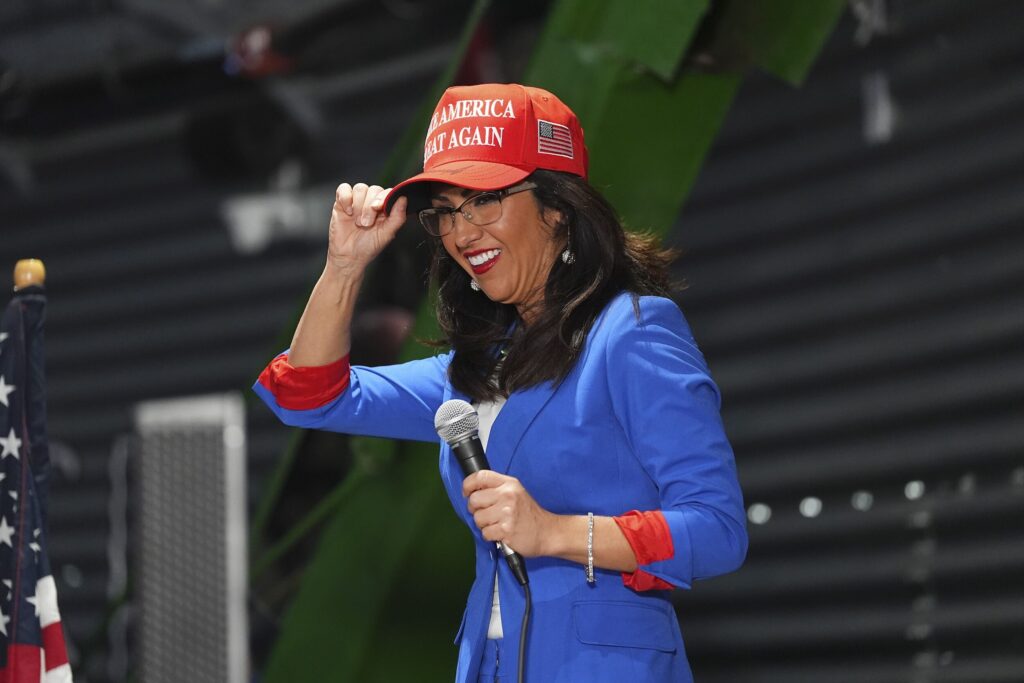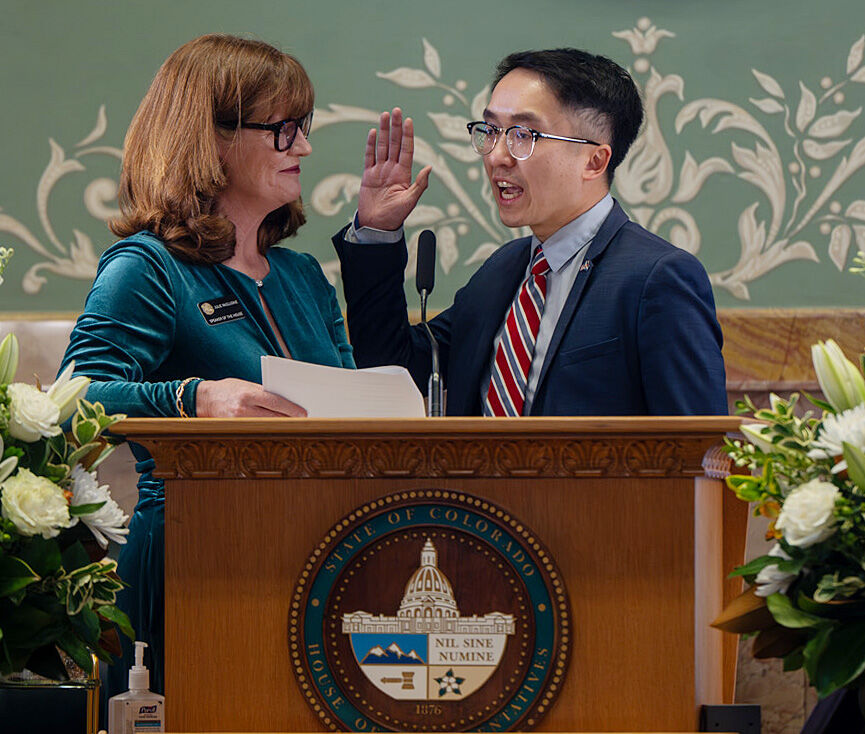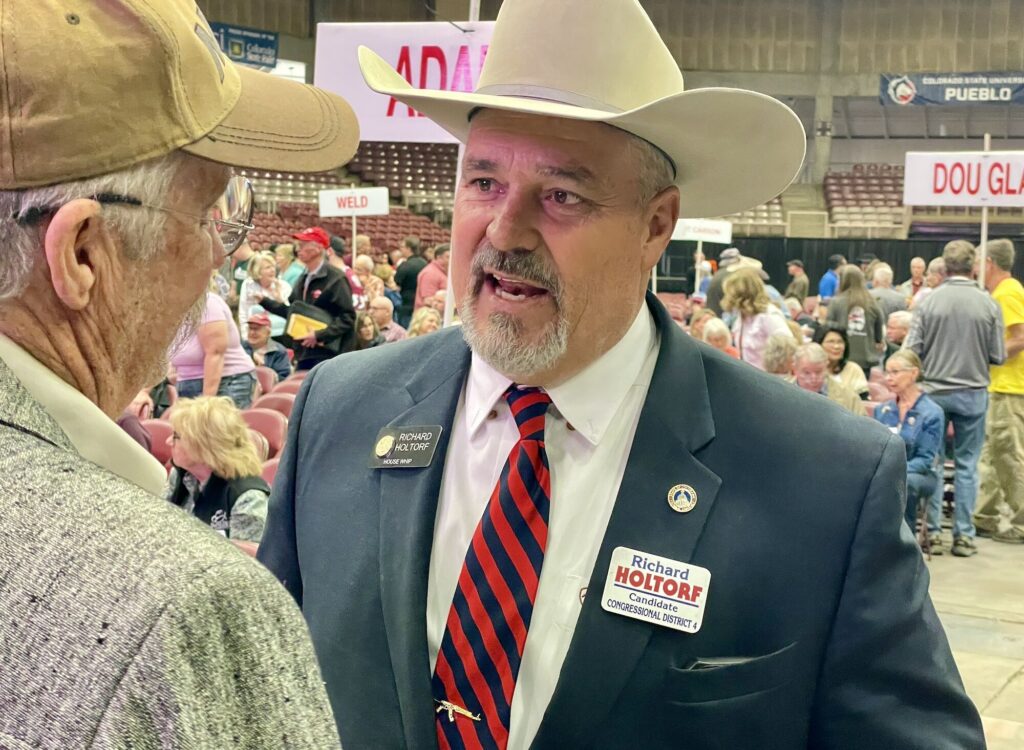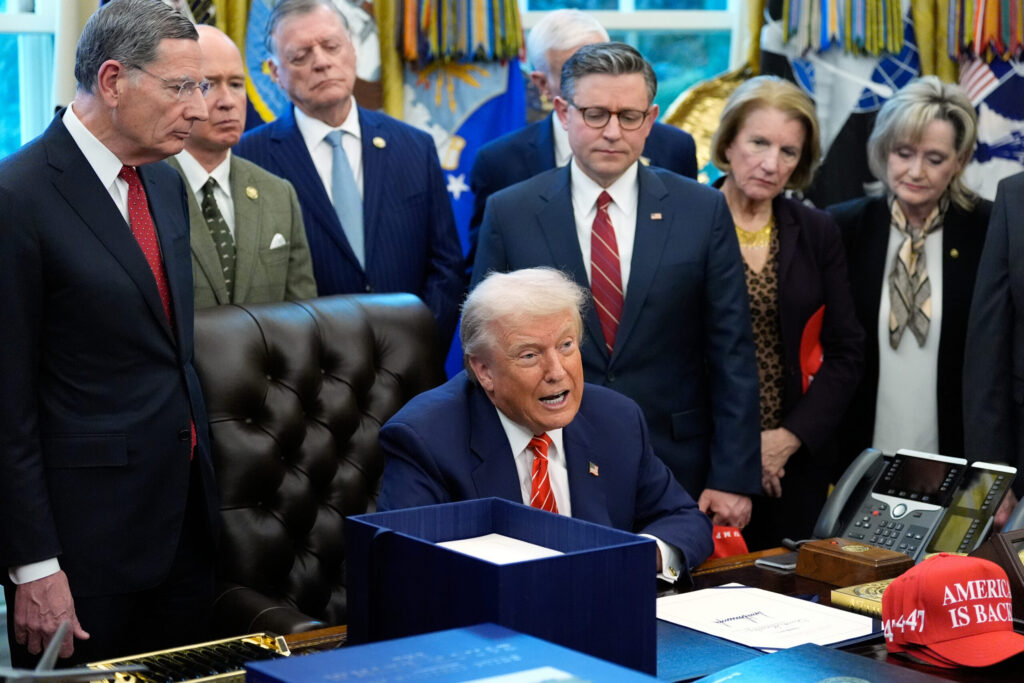ELECTION 2022 | Five takeaways from Polis and Ganahl’s latest gubernatorial debate
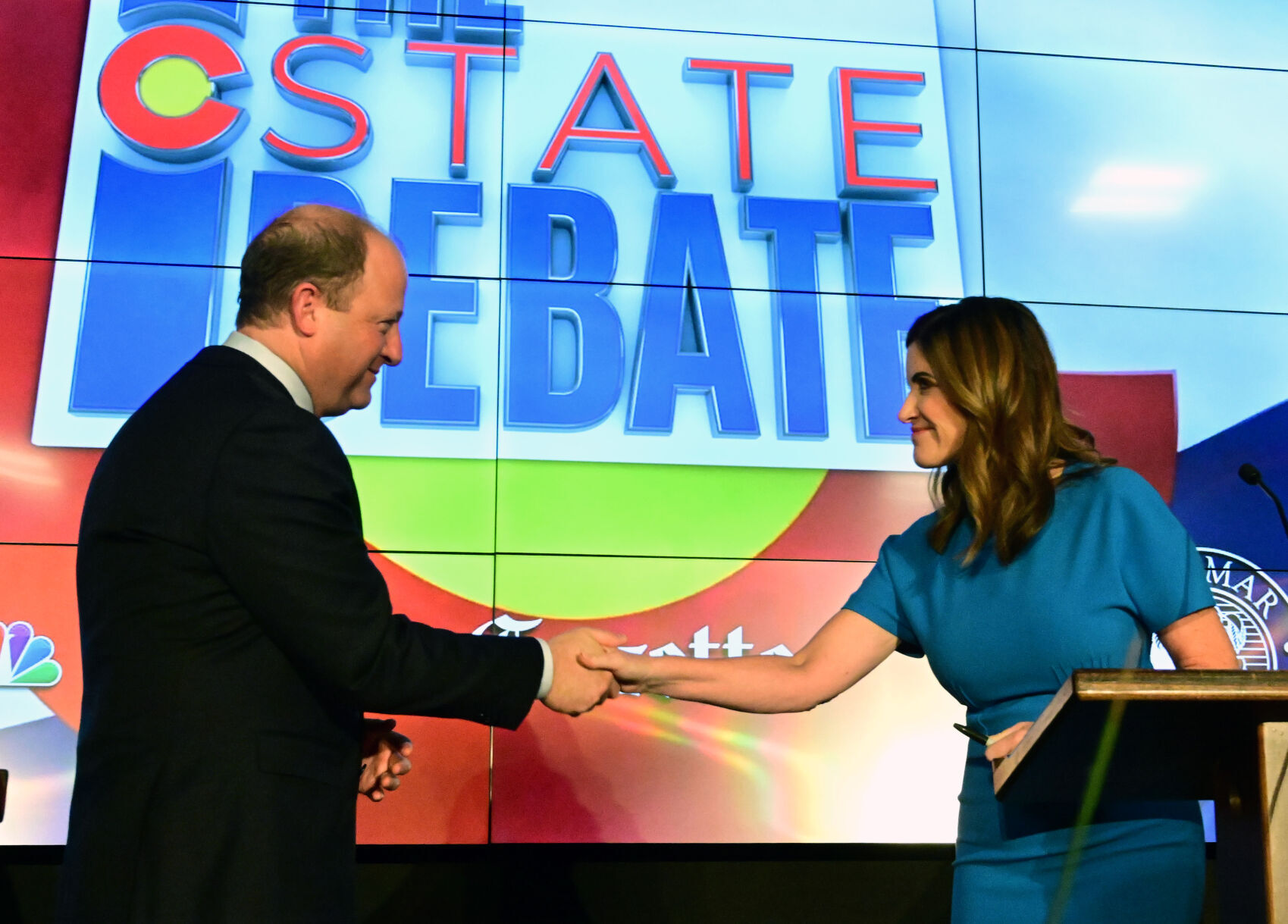
Colorado’s Democratic Gov. Jared Polis and University of Colorado Regent Heidi Ganahl, his Republican challenger, squared off Sunday in Colorado Springs for their third general election debate, held the day before county clerks started mailing ballots to most state voters.
The fast-paced, hourlong debate, sponsored by the Colorado Springs Gazette, Colorado Politics, KOAA and The El Pomar Foundation’s Forum for Civic Advancement, covered topics ranging from the state’s economy and cost of living to public safety and energy policy before an audience of about 200 at Penrose House at The Broadmoor.
The candidates met first in Pueblo in late September and sparred again last week in Denver. Their final face-off is set for Oct. 25 in Grand Junction. It’s an unusually lean course of debates for a Colorado gubernatorial campaign, amounting to fewer than half the number of debates Polis and his Republican opponent, then-State Treasurer Walker Stapleton, engaged in four years ago.
Polis and Ganahl each decided against attending one of the debates that would have bookended the fall campaign – Polis declining an invitation to the Club 20 debate in Grand Junction in early September, citing a scheduling conflict, and Ganahl pulling out of the planned 9News debate on Oct. 27 in Fort Collins over her complaints the TV station was biased. Colorado Politics and The Denver Gazette were among the latter debate’s co-sponsors.
While polls and pundits predict Polis is cruising to a second term, three weeks remain until votes are counted – an eternity in politics, particularly in an election year when the buffeting winds of national and global events have rearranged the electoral landscape more than once.
Sunday’s debate was moderated by News5 anchor Rob Quirk with questions served up by anchor and political specialist Alasyn Zimmerman and yours truly. From that perch, here are five takeaways from the spirited exchange:
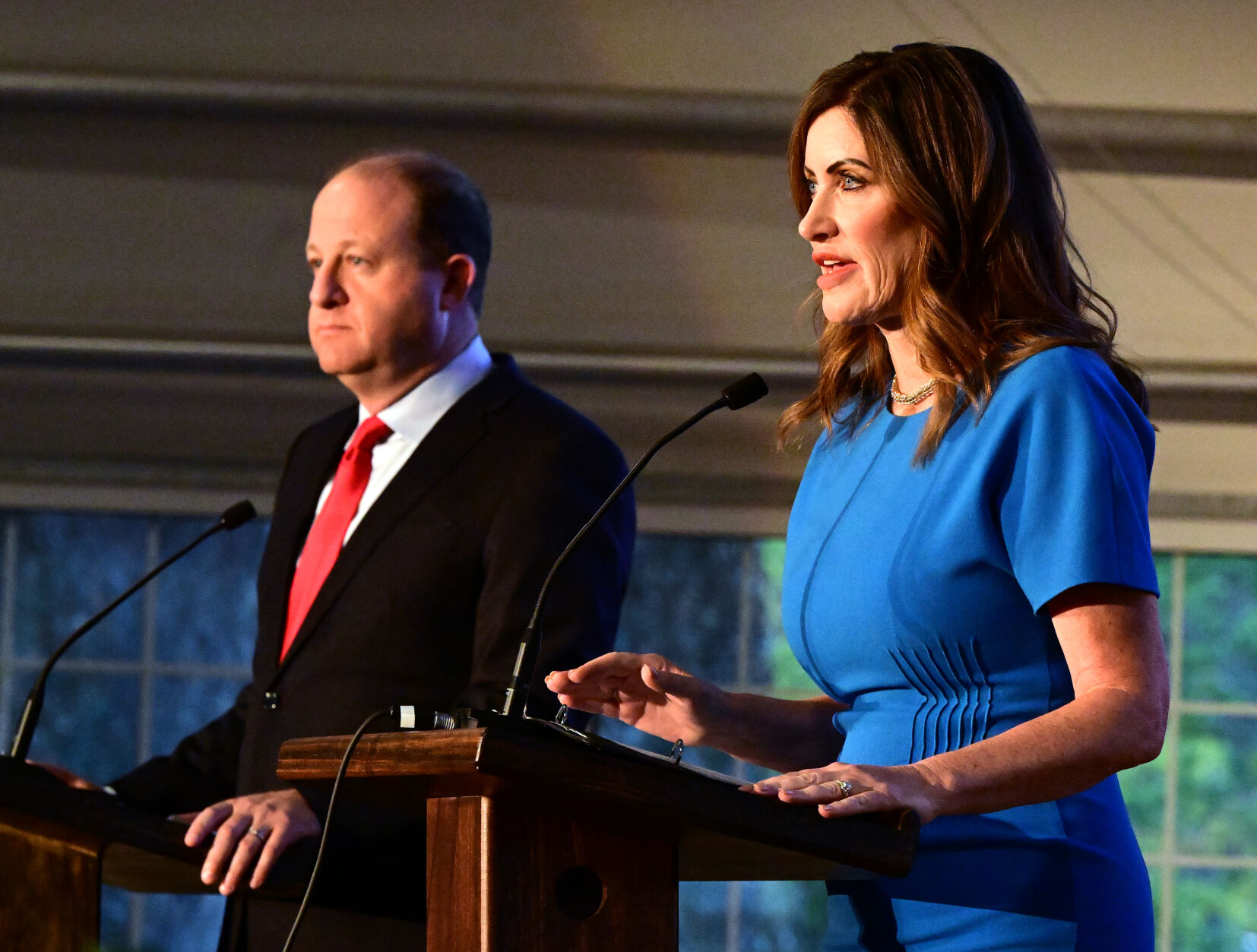
POLIS POINTS TO HIS RECORD; GANAHL STICKS TO PLAYBOOK
Both candidates unfurled the same arguments they’ve been making since kicking off their campaigns, with Polis and Ganahl conveying sharply different portrayals of the state they want to lead for the next four years.
Polis boasted that he’s fulfilled chief campaign promises made during his first run – including providing full-day kindergarten without charge to parents, reducing the cost of some health insurance premiums and capping the cost of insulin.
“When I am first announced my campaign in Pueblo, Colorado, four years ago, a lot of people said those are great ideas, show us you can get it done. I stand before you now to say what I’m talking about today aren’t just words – we have a plan to get it done,” he said and then listed promises for a second term.
“One, we will keep Colorado moving forward. We have one of the strongest economies in the nation, growing good jobs, making sure that people have access to all the great opportunities the private sector has to offer. Two, we’re going to tackle the high cost of housing. We’re going to make sure that we can have more housing close to our jobs, reducing commute time and traffic and lowering costs. And three, we’re gonna make Colorado one of the 10 safest states in the country with investment in more and better policing, with tougher penalties and preventing crime before it happens.”
Ganahl was having none of it, repeatedly telling viewers to “hold him accountable” as she ticked off a litany of complaints.
“Jared wants you to reelect him to try to fix the problems that he created,” she said before flatly declaring: “Polis is the problem. Crime, drugs, inflation – when you vote, hold him accountable. And when I’m governor, I expect you to do the same with me. I’m a problem solver. Not a politician, but I will get the job done.”
Added Ganahl: “I will not stand by and watch our beautiful state, my kids’ state, destroyed. As your governor I’ll put law and order leadership in charge. I’ll clean up our streets, keep repeat offenders in jail, cancel our sanctuary status and block the flow of fentanyl into Colorado.”
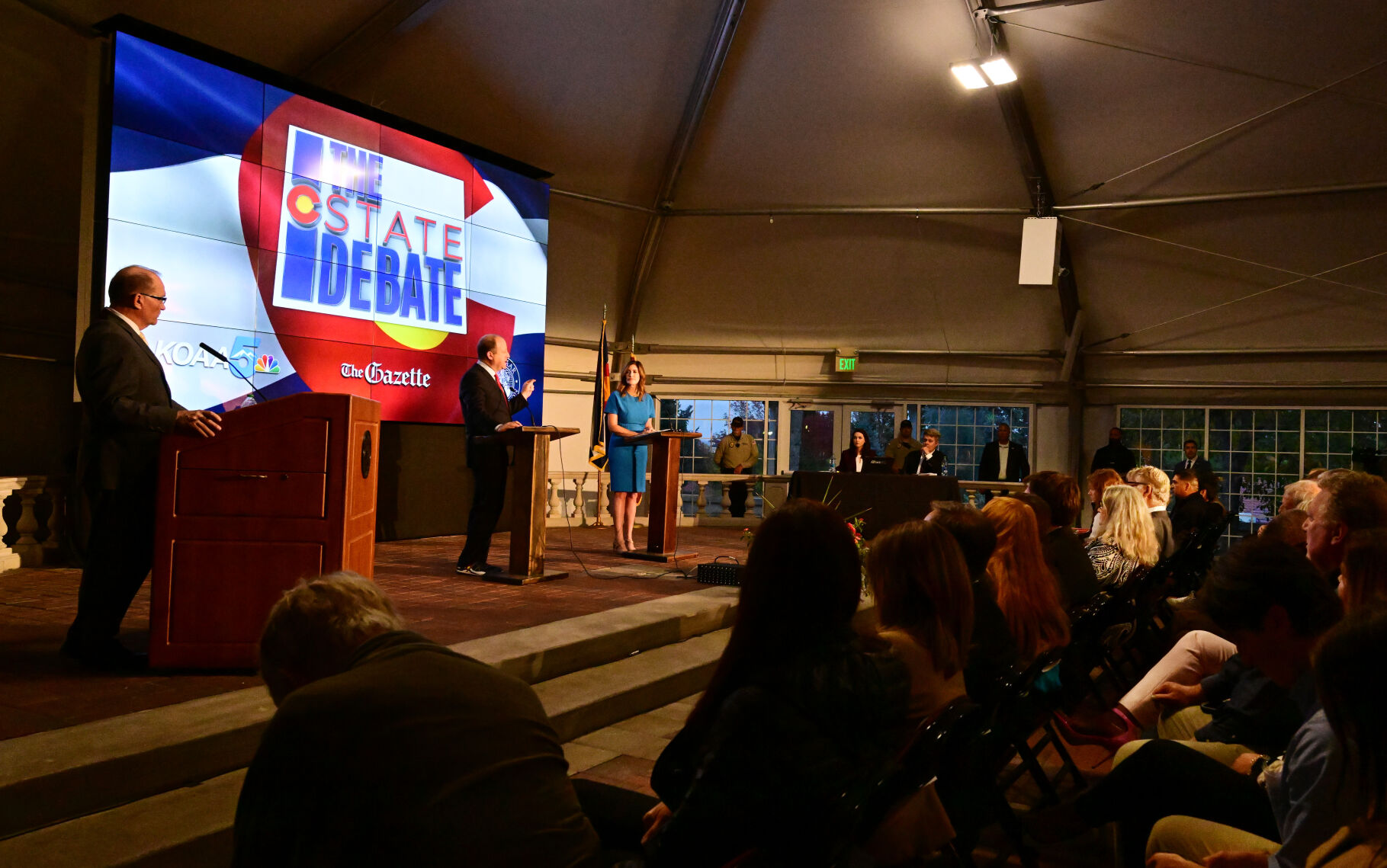
THEY AGREE ON A FEW THINGS
Asked at the outset of the debate to identify an accomplishment or proposal from their opponent that they think is a good idea, both candidates pointed to their rival’s work involving charter schools.
Polis founded the New America School, which operates on three metro-area campuses and educates new immigrants, students who are learning English and nontraditional students. He also cofounded the Academy of Urban Learning, a Denver charter school dedicated to serving homeless and at-risk youth. Ganahl tried to open a charter school in Boulder County but was unsuccessful so moved her family to Douglas County.
“I do think we agree that school choice is very important, and I applaud Governor Polis for opening a charter school early on many years ago,” Ganahl said at the debate. “I am so passionate about getting our kids back on track.”
Polis described bringing Republicans on board with major policy initiatives and tipped his hat to Ganahl for her efforts to expand school choice.
“I don’t believe that either party has a monopoly on good ideas or (that) any ideology holds the market in good ideas,” he said. “We need to make sure that we encourage creativity and innovation. I applaud that my opponent also, as I have, started to help start a charter school.”
He then referred to another topic where they share common ground: the goal of zeroing out Colorado’s state income tax.
“I also praise the intent behind her work to abolish the state income tax in Colorado,” Polis continued.
Even discussing their enthusiasm for cooperating across party lines, the candidates took some shots at each other.
After lauding Polis for the charter schools he opened, Ganahl turned her fire on the charter system in general and got in her customary digs at the state’s woes.
“I just want to make sure that we fix these huge problems that we’re facing right now like skyrocketing crime, out of control inflation and, most of all, make sure our kids get back on track,” she said. “So how do we do that? Well, we go all-in on school choice – we don’t just talk about it. We don’t just nibble around the edges. We actually approve charter schools.”
Polis, for his part, pivoted from praise for Ganahl over their shared goal of eliminating the income tax to harsh criticism of the particulars of her plan.
“The math doesn’t work, the plan doesn’t work,” he said, asserting that under Ganahl’s proposal the state would have to slash funding for schools or dramatically raise property taxes. “But again, I think it’s great that both candidates are talking about how we can reduce the income tax. That’s a good thing for Colorado; it’s the ‘Colorado Way.’ The income tax hurts productivity. We can reduce it if we can phase it out. That’s a that’s a very good discussion to have. And I’m happy to have it with Republicans and Democrats across the state.”
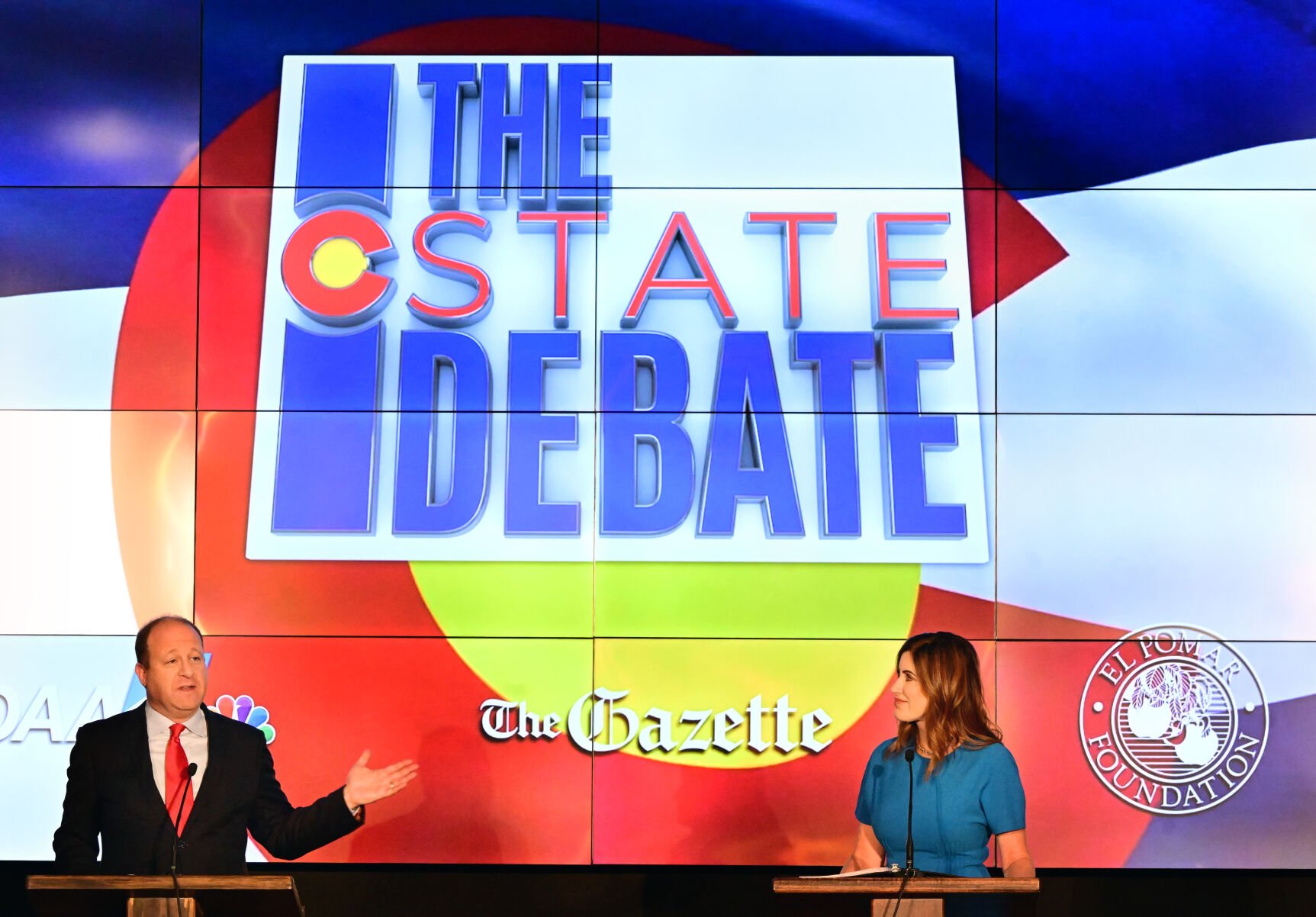
NEITHER SAY THEY’LL ROLL BACK ABORTION RIGHTS
Ganahl reaffirmed a recent retreat from her earlier vow to “rip up” a Colorado law signed earlier this year by Polis that guarantees access to abortion in Colorado, virtually without limits. Passed in anticipation of the Supreme Court’s ruling that overturned Roe v. Wade, the Reproductive Health Equity Act has drawn heated criticism from Republicans – who unanimously opposed it in the legislature – as abortion rights have become one of the flashpoints of the midterm election.
Saying she wants to “bring common sense back to Colorado,” where she said “abortion should be rare and safe,” Ganahl slammed the law but said it’s up to voters to weigh in.
“What’s not common sense is a radical bill that was signed without the will of the people of Colorado, without a vote of the people of Colorado that allows abortion up until the baby’s birth date in the final weeks of pregnancy,” she said after recounting her own “bumpy” journey to motherhood. “And I think we can do better in Colorado.”
Recalling her dramatic gesture during a primary debate, Ganahl acknowledged that she “did rip up that disgusting bill because of late-term abortion,” but added, “I want to make sure that I don’t divide us any more. So I’ve made a pledge that any changes to abortion law will go to a vote of the people of Colorado. I will not sign it. I will put it back to a vote of the people of Colorado to make sure this issue does not divide us anymore.”
She noted that she wants to make it easier for parents to adopt children in Colorado and described her work to support families.
“So I will always support women. I understand it’s a very difficult issue and I don’t want to divide Colorado any more. I want to bring us together on it,” she said.
Polis disagreed that the law he signed goes too far.
“I fundamentally believe that the government should not make women’s health care decisions,” he said. “Nothing could be more intimate, more challenging, more difficult. The decision that a woman faces, we need to make sure that that’s between a woman and her doctor. Let’s be clear here: My opponent said she would rip up the law that protects Coloradans from having police and district attorneys go after them for choosing to end a pregnancy.”
Polis noted that Coloradans have voted down ballot measures to restrict abortion five times in recent years and reminded the audience that Ganahl celebrated the decision that did away with Roe.
“For better or worse, it’s now up to states,” he added. “I want to make sure that Colorado remains a state where the government and bureaucrats don’t insert themselves into that very private, difficult conversation between a woman and her doctor.”
Ganahl responded, “I do believe Roe vs. Wade should be a state’s decision and Colorado has spoken. You passed a law without the will of the voters and I would like to go back to the voters of Colorado to find a compromise.”
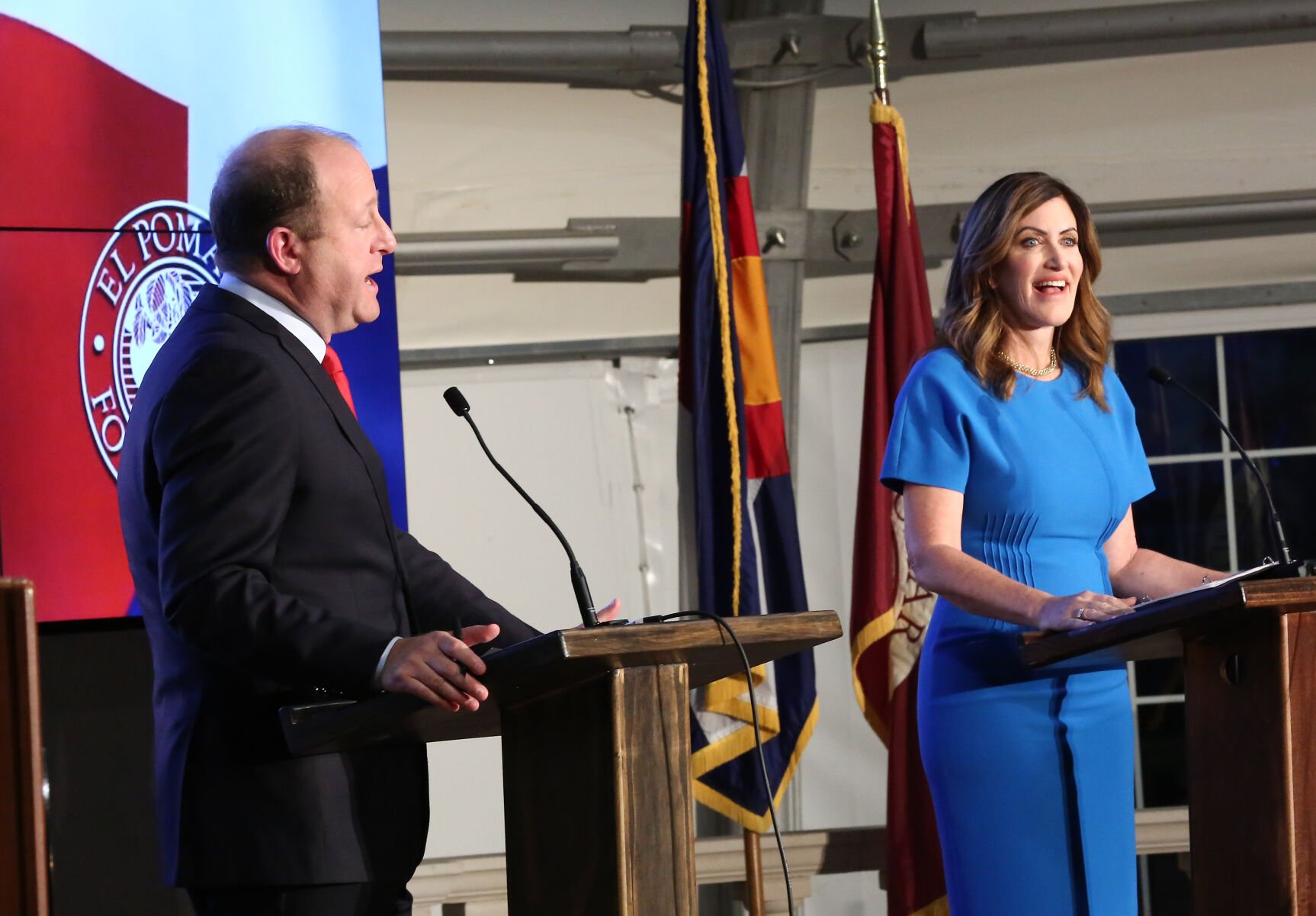
THIS CAKE COULD BE BAKED
Though rarely, elections have turned on candidate debates enough that underdogs approach them determined to upset the game board.
Since June, before Ganahl emerged from a two-way Republican primary against former Parker Mayor Greg Lopez, Polis has held a convincing lead in polls, with more than 50% support and up by double digits in all but a couple polls conducted by Republican firms, and even those found Polis at 49% support, well ahead of Ganahl and outside the margin for error.
Heading into the most recent round of debates, Ganahl needed to score some knockout blows or for the Democrat to stumble badly – like the blunder that swung last year’s Virginia governor’s race to Republican Glenn Youngkin, when Democratic nominee Terry McAuliffe declared, “I don’t think parents should be telling schools what they should teach.”
Staying on the attack, Ganahl has peppered her opponent with criticism throughout the debates, but the governor has maintained an even keel and so far avoided veering off course or providing his foe any late-breaking fodder.
One debate remains, though by the time the candidates deliver their closing remarks in Grand Junction next week, it’s a safe bet that hundreds of thousands of Coloradans will have already returned their ballots, so while the possibility of a last-minute reversal remains, the prospects are dimming.
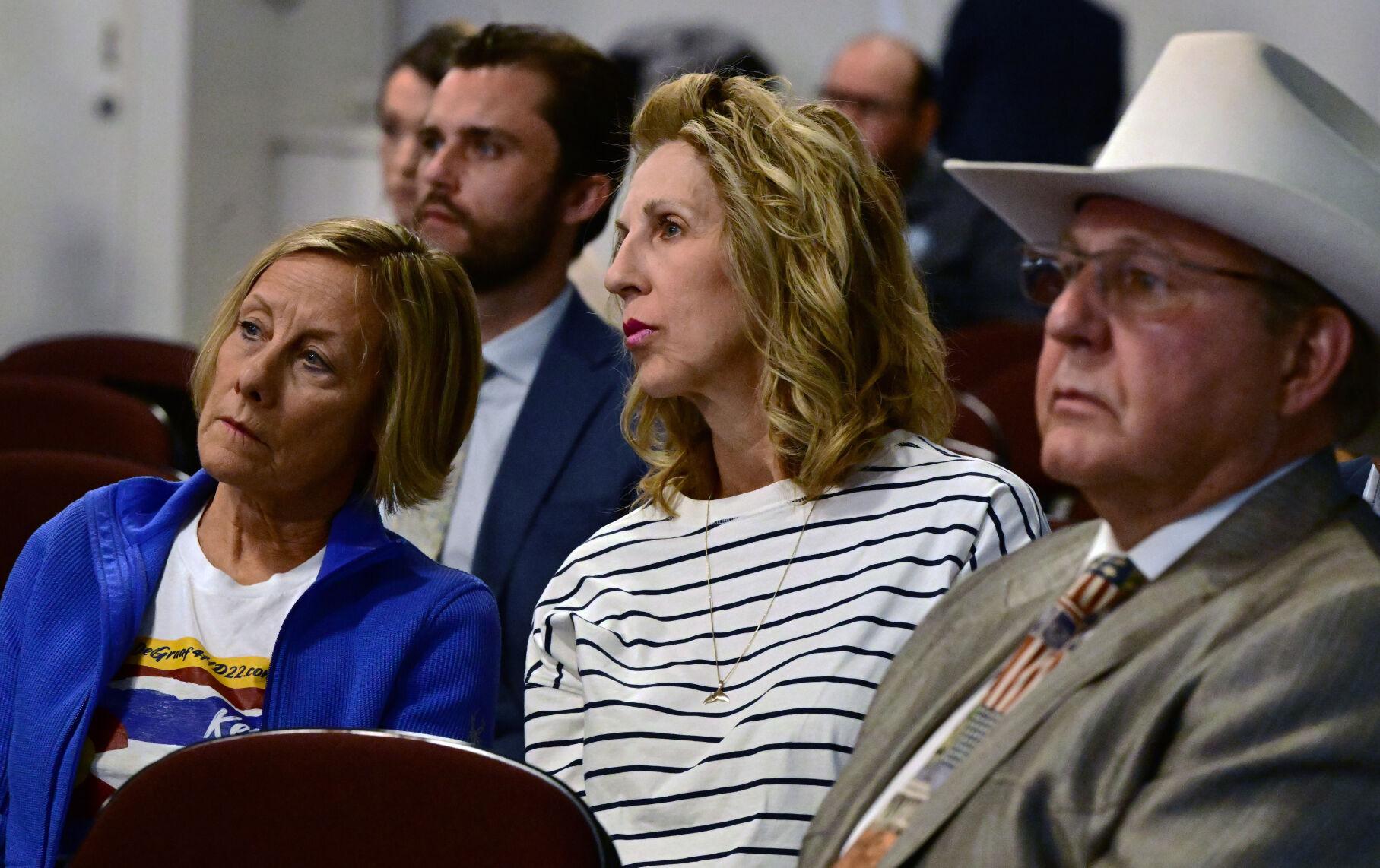
CHEERLEADER IN CHIEF?
The candidates returned frequently to a fundamental difference between their two campaign – the incumbent’s sunny take and his challenger’s dire portrayal of the state of the state, along with her determination to turn things around.
Polis disputed Ganahl’s characterization of Colorado’s predicament.
“Look, this is fundamentally a decision about moving Colorado forward,” he said. “I don’t even recognize the dystopian version of wherever she lives. Colorado is the best state in the country to live in, and by the way, one of the jobs of governors is cheerleader. Look at what we’re saying! How good will my opponent be in promoting the great state of Colorado?”
Referencing the millions of dollars Polis has poured into his own campaigns over the years, Ganahl declared that her opponent “can’t buy our vote with the $24 million in fake TV ads telling us everything’s just fine. You can’t run from this terrible record.”
Both wealthy entrepreneurs – Polis has launched multiple high-tech enterprises and Ganahl built a national dog day care franchise – have self-financed their races. Polis sunk roughly $24 million into his campaign four years ago, and campaign finance reports show he’s donated in the neighborhood of $11 million to his reelection bid. Ganahl, for her part, has loaned her campaign in the neighborhood of $1.3 million, including $400,000 in the first part of October.
“I am honored every day to roll up my sleeves and work late into the night to make Colorado an even more amazing place,” Polis said, all but waving pompoms. “And if you give me the chance to keep serving, I’ll show you that Colorado’s best days are still ahead.”
Ganahl struck an optimistic note in her closing remarks, too.
“I’m offering a brighter future here in Colorado, this state that I love so much,” she said. “Big bold ideas like I’ve talked about here to make it affordable again, safe again, free again.”
Ballots are set to arrive in Colorado voters’ mailboxes this week. They’re due back to county clerks by 7 p.m. Nov. 8.




